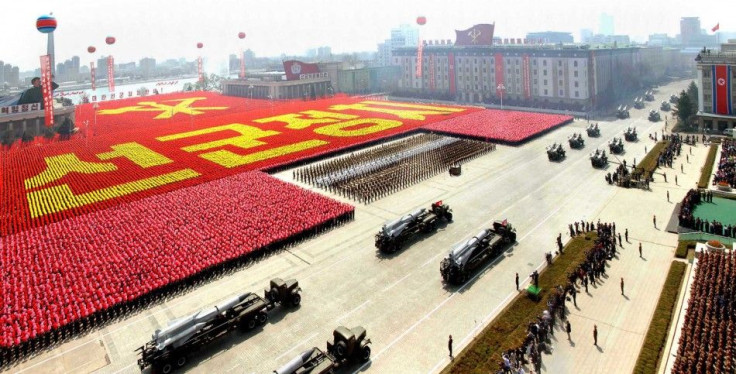North Korean Missile Launchers Came From China, US Didn't Report UN Sanctions Breach: Report

Japan has evidence that China shipped missile launch vehicles to North Korea last year, in a possible breach of U.N. sanctions on Pyongyang, Japanese media reported Wednesday.
The report, based on Japanese government sources, said that the U.S., despite having evidence to prove that China had violated U.N. resolution banning export of weapons to North Korea, didn't reprimand China to avoid embarrassing the Asian giant.
Beijing denied the violation of the U.N. sanctions, calling the report inaccurate.
Responding to the report published by Japan's Asahi Shimbun newspaper, U.S. State Department spokesperson Victoria Nuland said that Washington brought up the issue of the possible U.N. sanctions breach to Beijing in recent weeks but added that the U.S. will continue to work with China and others to enforce the U.N.'s sanctions on North Korea's ballistic and nuclear missile program.
A U.S. State Department official in April said that Washington took Chinese officials at their word that they hadn't violated the U.N. sanctions, an Agence France-Presse report said.
The Japanese report said Washington, Tokyo and Seoul had been more concerned about stopping Pyongyang from carrying out a third nuclear test and had needed Beijing's help in doing so. That was not a good time to force China into a corner, an unnamed Japanese government source was quoted as saying by the Japanese newspaper.
The large 16-wheeler transport vehicles carrying ballistic missiles, featured during the mass military parade in Pyongyang's Kim Il Sung Square to mark the birth anniversary of North Korean founder Kim Il Sung April 15, were believed to have come from China and were mentioned in a shipping report obtained by the Japanese government, Asahi Simbun reported.
The Japanese government acquired a document that provided concrete proof that a Chinese company had exported four missile launch vehicles, the report said.
However, the U.S., Japan and South Korea decided against approaching the U.N. in return for Chinese efforts to prevent North Korea from conducting a nuclear test.
In a meeting in Beijing April 23 between Chinese President Hu Jintao and North Korean leader Kim Yong Il, Hu said Pyongyang's actions were starting to affect China's national security by strengthening the position of the U.S., Japan and South Korea.
Hu said if North Korea went ahead with the proposed nuclear test, China would be forced to reconsider economic assistance to Pyongyang.
Dismissing intense speculation, North Korea Saturday denied having plans to conduct a third nuclear test but lashed out at the South for trying to rattle the nerves of the DPRK [North Korea] in a bid to cause it to conduct a nuclear test.
Pyongyang's Foreign Ministry spokesman last week denied plans for a nuclear test at present, adding that Seoul sought to paint Pyongyang with a belligerent nature in an attempt to create an atmosphere of putting pressure and sanctions on it. He said that the international community hoped that the Lee Myung-Bak government would step down for the detente on the peninsula and regional peace and stability.
China's North Korean policy has been a source of straining of Beijing's ties with Seoul, Tokyo and Washington over the years. Beijing had been accused of pursuing these policies despite Chinese citizens harboring a dislike for the North Korean leadership, the U.S. Institute of Peace said in a report last year.
© Copyright IBTimes 2024. All rights reserved.






















